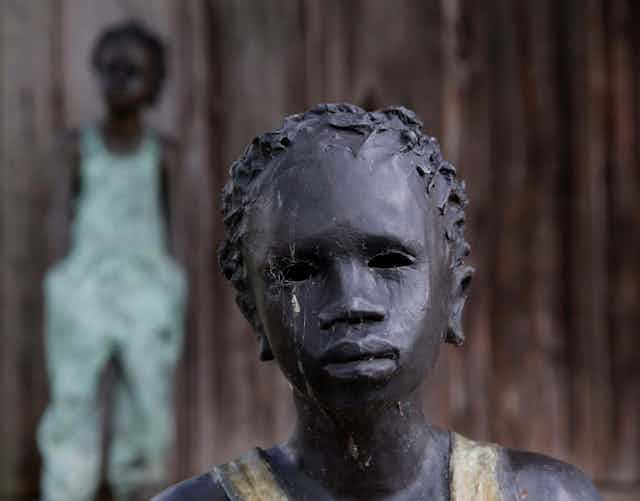Jewish survivors of the Holocaust have received reparations, but African descendants of victims of the slave trade have not — even though it’s a moral responsibility of the nations who benefited from slavery to provide them.
Read more: Why the West is morally bound to offer reparations for slavery
Some have pointed to Holocaust reparations as inspiration for those advocating the same for slavery descendants.
But in my book Reparations to Africa, I explain that one reason for the difference lies in the considerable obstacles confronting those of us calling for slave trade reparations.
My research for the book found it’s easier to obtain reparations when the event occurred within living historical memory. It’s also easier when there are only a few identifiable perpetrators. And it is still easier when there is a limited number of victims, and the event occurred within a short period of time.
What’s more, the monetary amount claimed must not seem unreasonable to the people expected to pay the reparations. Finally, the support of a powerful nation is helpful to those seeking reparations.
Within living memory
Much of this helped those seeking Holocaust reparations. Some survivors of the Holocaust are still alive, so the event is within living historical memory. The main perpetrator, Germany’s Nazi regime, is known. Approximately six million Jews were killed in the Holocaust, which took place over a short period of time, between about 1933 and 1945. And after the Second World War, the United States pressured Germany to pay reparations.
By 2020, the German government had paid about $70 billion to people who suffered from the Holocaust.

By contrast, the claim for reparations for the trans-Atlantic slave trade is much more difficult. Approximately 12.5 million Africans were shipped across the Atlantic over more than 300 years, of whom 10.7 million survived and actually landed in the Americas.
If you add people killed within Africa due to the slave trade, that figure could reach 30 million. And the number of descendants may well be in the hundreds of millions.
What’s more, none of the direct victims of the slave trade are still alive. Particularly for the descendants of the perpetrators of slavery, the historical memory is much more distant than the Holocaust.
Slave trade’s end
The legal and illegal trans-Atlantic slave trades lasted from the 15th to mid-19th centuries, ending about 150 years ago. The length of time since the trade ended makes it harder to persuade governments whose predecessors supported the trade that they should pay reparations to victims’ descendants.

There were many perpetrators of the slave trade. They included private slave traders and the governments of all the countries that both supported the slave trade and legally backed slavery. Some Africans were also implicated as sellers of slaves, attracted by payments offered by Western buyers. This makes it more difficult than it was for Jewish Holocaust victims to identify who should pay them reparations.
Finally, some activists claim as much as US$100 trillion dollars in reparations for the slave trade. This is a difficult figure for any government to accept. The United States GDP, for example, is currently at about US$21 trillion.
There’s also no world power agitating for reparations for the trans-Atlantic slave trade.
Centuries of atrocities
An accurate comparison of crimes against Jews to crimes against Africans would have to cover eight centuries of European history. For example, Jews were expelled from Britain in 1290 and could not return until 1656. The mass murders of Jews, known as pogroms, were common in Russia and eastern Europe in the late 19th and early 20th centuries. The last pogrom took place in Kielce, Poland in 1946, after the Second World War, perpetrated by native Poles.
There’s little doubt the Jewish community would also experience great difficulty seeking reparations for all these atrocities over so many centuries by so many people; the Holocaust allowed them a specific focus.
Nonetheless, there have been some successful movements for reparations to Africans for crimes committed during the colonial period. The Herero are an ethnic group living in southwest Africa, now Namibia, which was once colonized by Germany. From 1904 to 1905, about 60,000 Herero were massacred by Germans who wanted their land. The German government apologized for this genocide in 2021 and agreed to fund $1.3 billion worth of reconstruction and development projects in Namibia.

The social movement for reparations in this instance succeeded because there were comparatively few Herero victims. When the campaign started, the massacre was still within living memory. There was one known perpetrator, the German government. And the massacre took place within a short period of time.
The Herero situation was also similar to the Holocaust. Having accepted responsibility for the Holocaust, Germany could hardly deny it for the Herero massacre.
The descendants of the African slave trade absolutely deserve reparations.
But there are major obstacles facing the social movement for reparations for the slave trade. Those reparations are a moral imperative, but politically, successfully obtaining them will be extremely difficult.

